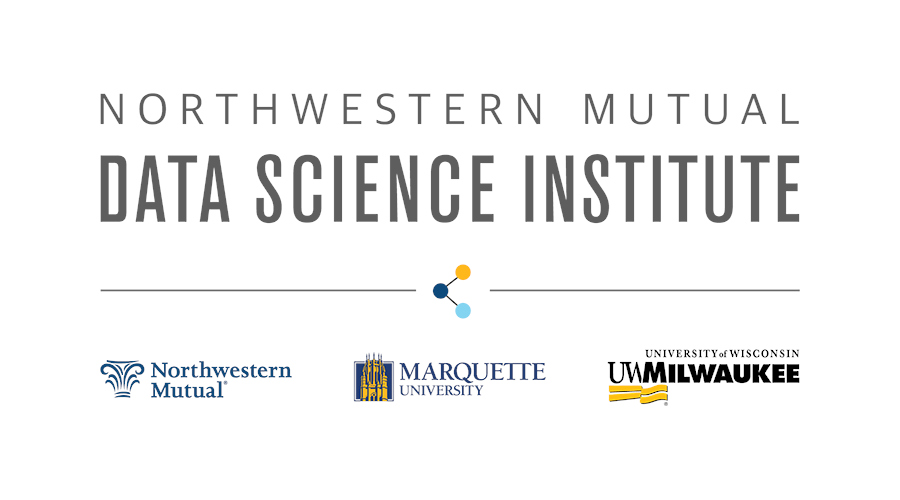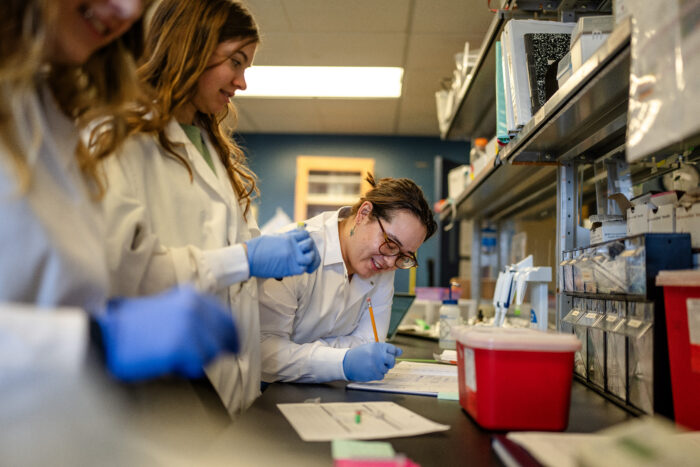
Marquette University, through its membership in the Northwestern Mutual Data Science Institute, has awarded seven $50,000 grants to Marquette faculty to fund a variety of data science research projects touching on health care — mental, general and dental, food scarcity, and artificial intelligence learning.
The chosen projects represent five different colleges on campus, as well as the Graduate School, School of Dentistry and three community partners and will address:
- Expanding access to mental health care with quantum computing and AI
- Auto-completion capabilities for a patient’s chief complaint when seeing a doctor
- Aligning AI and learned mental shortcuts
- Predicting regional food shortages
- Adaptive and low-cost machine learning methods for health care apps
- Expanding computational abilities to diagnose cancer
- Follow-up care after emergency department visits for nontraumatic dental conditions
This grant program is the NMDSI’s first funding to support external proposals.
“I am excited that we were able to develop a mechanism to fund seven promising research projects being led by Marquette faculty,” said Scott Rex, Marquette co-director of the NMDSI. “We identified a unique opportunity to stimulate research on campus and I was blown away by the reception. We received a large and diverse pool of interesting proposals that engaged nearly every corner of campus and many nontraditional uses of data science. We’re anticipating that NMDSI will be able to support this kind of faculty-led research annually, so this program lays the groundwork for these future research opportunities that will benefit faculty members at both Marquette and the University of Wisconsin-Milwaukee.”
The NMDSI is an academic partnership among Northwestern Mutual, Marquette and UWM with the intention to build a technology ecosystem and advance southeastern Wisconsin as a national hub for technology, research, business and talent development, while creating an organic pipeline of tech talent in the area.
“With the proliferation of data science and increased attention of emerging technologies, it’s important now more than ever that we continue investing projects like these, which accelerate our mission, advance equitable outcomes, and have direct societal impacts,” said Jonathan Stark, executive director of the NMDSI. “It is through our work with existing and emerging engagement with other community, academic, and industry partners that demonstrates our commitment for regional impact in Milwaukee and beyond.”
More information on the funded projects (* notes an NMDSI-affiliated faculty member; team members are Marquette faculty unless otherwise noted):
- Quantum computing and AI for advancing mental health care in Milwaukee: Insights from the Human Connectome Project (Research team: Sheikh Iqbal Ahamed* (PI), Wehr Professor of Computer Science; Dr. Naveen Bansal*, professor of mathematical and statistical sciences; Dr. Daniel Pinto, assistant professor of physical therapy; and Dr. Mohammad H. Rahman, associate professor of mechanical engineering at UWM)
- The demand for mental health services in the U.S. is high, but access to care remains a significant barrier. In recent years, there has been a growing interest in utilizing new technologies, including quantum sensing and computing, in mental health care to improve diagnosis and treatment outcomes. As the demand for mental health services continues to rise in the U.S., there is a need to explore and invest in innovative approaches that can address the challenges of access and provide better outcomes for those affected by mental health disorders. This project proposes to develop a quantum machine learning system for mental health protection and detection using quantum sensing and computing. The system aims to leverage the unique properties of quantum sensing devices to detect biomarkers associated with mental health disorders and use quantum computing resources to process and analyze the data.
- Auto completion of chief complaint (Research team: Priya Deshpande (PI), assistant professor of electrical and computer engineering; Dr. Praveen Madiraju*, associate professor of computer science; and Dr. Carissa W. Tomas, assistant professor of epidemiology and social sciences at the Medical College of Wisconsin)
- When a patient seeks medical care their chief complaint — a brief statement that explains why a patient is seeing a doctor — is recorded several times. The limited time and information available during triage can sometimes result in an oversimplified or inaccurate chief complaint, which may not fully capture the patient’s symptoms or concerns, leading to a potentially negative impact on the diagnostic process. The goal of this study is to employ natural language processing techniques to create an auto-complete tool for chief complaints in emergency department settings.
- Aligning generative AI and human heuristics(Research team: Larry Zhiming Xu* (PI), assistant professor of strategic communication; Dr. Praveen Madiraju*, associate professor of computer science; and Dr. Kambiz Saffarizadeh, assistant professor of information systems, analytics and supply chain management)
- Despite new promises, growing evidence has shed light on the widening gap between generative AI and human heuristics — mental shortcuts on which humans rely to make decisions. Heuristics are an important cognitive basis of human behavior, as they help us quickly determine whom to trust, how to act and what to believe. The investigators are particularly interested in understanding the technological and psychological implications of the ever-increasing ability of generative AI through examining the intricacies of human decision-making. Findings from this research may be especially informative to the Milwaukee communities, where underserved populations are experiencing resource scarcity that prevents them from accessing health and social services. Thus, generative AI, if designed and used properly, may lend itself to an unprecedented game-changer for community engagement and social good.
- Predicting regional food shortages using data integration, machine learning, and a predictive and visual analytics pipeline (Research team: Walter Bialkowski*, assistant professor of practice in the Department of Computer Science; and Jeff Joslyn, chief operations officer, and Casey Hoff, health and nutrition policy analyst, both from Feeding America Eastern Wisconsin)
- Food insecurity is an existential human threat and, while food shortages affect people across most socioeconomic classes, food-insecure people are more heavily impacted by supply-chain shortages. Emergency food systems persist to ensure that food-insecure individuals have access to enough nutritious food to feed themselves and their families; however, many factors produce food shortages, including environmental factors such as weather; soil; environmental health; pests and population, and economic factors such as market supply and demand; political climates; and inflation. Interrogation of this data to produce actionable intelligence is vitally needed. In the proposed project, researchers aim to scale a previously developed methodological pipeline and combine findings with data further upstream of food shortages so that regional food shortages may be predicted before impacting food hubs.
- Adaptive and low-cost machine learning methods for health care applications(Research team: Keke Chen* (PI), Northwestern Mutual Data Science Institute Associate Professor of Computer Science; Dr. Bing Yu*, associate professor of biomedical engineering; and Dr. Zeyun Yu, professor of computer science and biomedical engineering at the University of Wisconsin-Milwaukee.)
- Machine learning plays a significant role in many health care applications. While general deep learning models benefit from large training data, many health care applications have difficulties in collecting sufficient training data from actual clinical settings to train high-quality models due to limitations in available subjects, high costs and uncertain application environments, among other challenges. These unique problems make developing models for health care applications extremely challenging. This project aims to use the recently developed machine learning techniques to address the data scarcity problem for health care applications and adapt models to diverse clinical settings. Researchers will also study the techniques to reduce the size of large models to apply them to resource-strapped point-of-care devices and clinical environments.
- Graph-Based Learning in Computational Pathology(Research team: Nasim Yahyasoltani* (PI), Northwestern Mutual Data Science Institute Assistant Professor of Computer Science)
- The usage of whole slide images in computational pathology for diagnosis has recently risen dramatically as preliminary diagnosis by machine can help pathologists be more efficient in diagnosis and may assist to avoid certain mistakes. This project aspires to develop a novel framework for efficiently learning and diagnosing cancer from whole slide images. It specifically focuses on learning the context, such as topological features in the tumor surroundings, as they hold important information for cancer grading and diagnosis.
- Follow-up care after Emergency Department visits for Non-Traumatic Dental conditions (NTDC) in Southeastern (SE) Wisconsin (Research team: Dr. Pradeep Bhagavatula (PI), professor of dental clinical services; Dr. Shengtong Han*, assistant professor of research biostats in the School of Dentistry; Naveen Bansal*, professor of mathematical and statistical sciences; and Dr. Wenhui Sheng, assistant professor of mathematical and statistical sciences)
- Oral diseases such as dental caries and periodontal disease are progressive, but largely preventable and easily manageable in a regular dental practice setting. Lack of access to regular dental care may force people to seek care from hospital emergency departments for acute episodes of pain or abscesses that are not related to trauma. Unfortunately, dental care in an emergency department setting is not definitive with limited care continuity that ultimately leads to poor oral health outcomes. Very little is known about the frequencies of these visits, demographic differences, procedures provided to patients in the emergency department, or any follow up care after the visit. Using recent datasets, the goals of this project are to characterize the specific demographic characteristics of people receiving this care and assess trends; examine the proportion of patients who receive definitive dental care after these emergency department visits; evaluate the relationship between insurance status and emergency department visits; and examine the proportion of people who have repeated visits to the emergency departments. The findings will be beneficial to health administrators when making policies.


